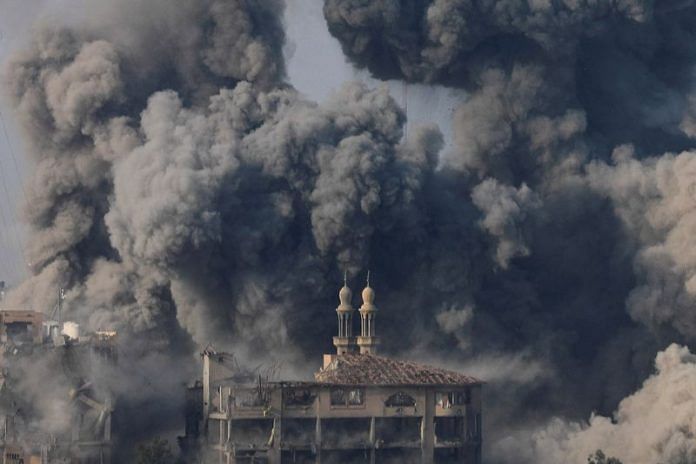By Anthony Deutsch and Stephanie van den Berg
THE HAGUE (Reuters) – Conflict between Israel and Palestinian forces since militant group Hamas’ weekend assault have created a huge and rising death toll on both sides.
The war falls under a complex international system of justice that has emerged since World War Two.
WHAT LAWS GOVERN THE CONFLICT?
Internationally accepted rules of armed conflict emerged out of the 1949 Geneva Conventions, which have been ratified by all U.N. member states and supplemented by rulings at international war crimes tribunals.
A series of treaties governs the treatment of civilians, soldiers and prisoners of war in a system collectively known as the “Law of Armed Conflict” or “International Humanitarian Law”. It applies to government forces and organised armed groups, including Hamas militants.
If alleged Palestinian perpetrators of atrocities in Israel and all alleged perpetrators of crimes on the occupied Palestinian territories are not brought to justice at home, the International Criminal Court (ICC) in The Hague is the only international legal organ able to bring charges.
Domestic courts can apply so-called universal jurisdiction in war crimes cases, but that would be limited in scope.
The ICC’s founding Rome Statute gives it legal authority to investigate alleged crimes on the territory of its members or by their nationals, when domestic authorities are “unwilling or unable” to do so.
On Tuesday, the office of the prosecutor of the ICC confirmed that its mandate applies to potential crimes committed in the current conflict and said it continues to gather information.
WHAT IS THE ROLE OF THE ICC?
The International Criminal Court (ICC), the world’s permanent war crimes tribunals, opened in The Hague in 2002. It has jurisdiction over war crimes, crimes against humanity and genocide in its 123 member states or committed by its nationals.
Many of the world’s major powers are not members, including China, the United States, Russia, India and Egypt. The ICC recognises Palestine as a member state, while Israel rejects the court’s jurisdiction and does not formally engage with it.
With a limited budget and staff, ICC prosecutors are already investigating 17 cases ranging from Ukraine and Afghanistan to Sudan and Myanmar. The ICC budget has allocated just under a million euros ($1.06 million) for investigations in the Palestinian territories for 2023 and is seeking additional resources.
The ICC has had an ongoing investigation into allegations of war crimes and crimes against humanity committed in the occupied Palestinian territories since 2021.
It has not issued any arrest warrants.
Prosecutors said in 2021 there was a reasonable basis to believe that violations had been committed on all sides, including by Israeli troops, Hamas militants and other armed Palestinian groups.
WHAT ACTS COULD VIOLATE WAR CRIMES LAW?
New York-based Human Rights Watch cited as possible war crimes the deliberate targeting of civilians, indiscriminate rocket attacks, and the taking of civilians as hostages by Palestinian armed groups, as well as the Israeli counter-strikes in Gaza that killed hundreds of Palestinians.
“Deliberate killings of civilians, hostage-taking, and collective punishment are heinous crimes that have no justification,” said Omar Shakir, the group’s Israel and Palestine director.
The taking of hostages, murder and torture are explicitly banned under the Geneva Conventions, while Israel’s response could also be subject to a war crimes investigation.
Israeli Defence Minister Yoav Gallant drew criticism from U.N. officials and human rights groups by announcing a tightened blockade to prevent food and fuel from reaching the Gaza Strip, home to 2.3 million people.
Gallant also vowed to wipe Hamas “off the face of the earth” amid growing expectations Israel will launch a ground invasion to destroy the Palestinian militant group.
DO THE GENEVA CONVENTIONS APPLY?
Israel has a right and duty to respond, U.S. President Joe Biden said on Tuesday, adding that he and Israeli Prime Minister Benjamin Netanyahu had discussed “how democracies like Israel and the United States are stronger and more secure when we act according to the rule of law.”
A siege can be considered a war crime if it targets civilians, rather than a legitimate means to undermine Hamas’ military capabilities, or if found to be disproportionate.
Attacks on military objectives have to be proportional under international law which means they must not lead to excessive loss of civilian life or damage to civilian objects in relation to the direct and concrete military advantage expected.
Nick Kaufman, a British-born Israeli defence lawyer at the ICC, cited the gruesome killings by Hamas militants of hundreds of revellers at a dance rave and civilians in several Kibbutz communities near the Gaza border as an obvious focus for a war crimes case.
($1 = 0.9424 euros)
($1 = 0.9406 euros)
(Reporting by Stephanie van den Berg and Anthony Deutsch; Additional reporting by Heather Timmons; Editing by Andrew Cawthorne)
Disclaimer: This report is auto generated from the Reuters news service. ThePrint holds no responsibilty for its content.



